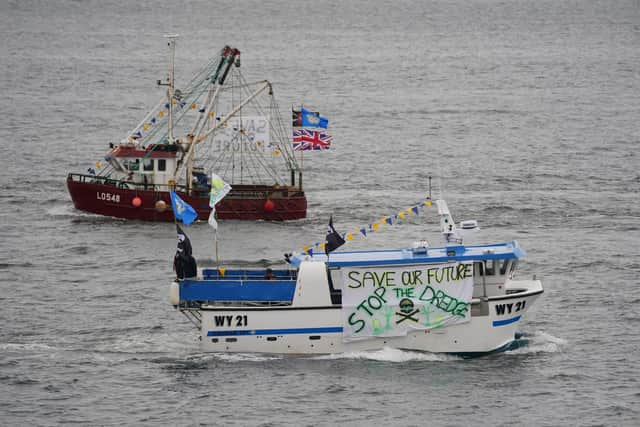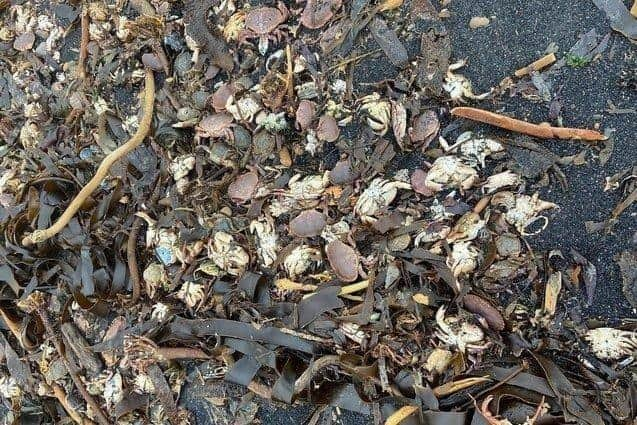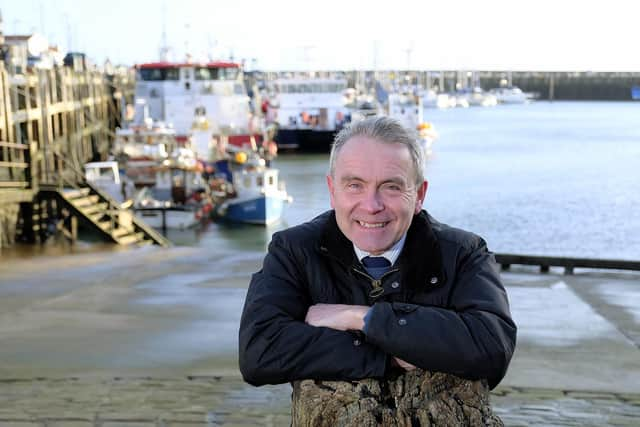MPs call for further investigation into mass deaths of crabs on Yorkshire and North East beaches
The request was made in a letter last week from Sir Robert Goodwill, chairman of the Environment, Food and Rural Affairs Committee which states that a study should be carried out “as a matter of urgency”.
Mr Goodwill is the MP for Scarborough and Whitby and beaches within his constituency were awash with dead marine life.
Advertisement
Hide AdAdvertisement
Hide AdThousands of dead and dying crustaceans washed ashore along parts of the north-east coast of England between October and December 2021 from as far apart as Hartlepool down to Whitby and including Staithes.


Mystery still surrounds the cause of the mass die-off but the independent crustacean mortality expert panel’s reports “a novel pathogen was the most likely” cause.
The letter also states: “The committee believes that further work should be undertaken to identify this novel pathogen, given the importance of determining its origin, its vectors of transmission, its transmissibility, its virulence and other factors related to it.
“Indeed, as the independent panel highlighted, a conclusive result from the broad diagnostic screening of samples would significantly affect the level of confidence in the novel pathogen theory.”
Advertisement
Hide AdAdvertisement
Hide AdDying creatures were seen “twitching” and displaying lethargic behaviour during the mass crab deaths on the coastline from Hartlepool to Whitby.


There were distressing scenes of large numbers of dead and dying lobsters and crabs on beaches while fishing crews warned sparse catches offshore following the event were “catastrophic” for their livelihoods.
The BBC aired a documentary back in October with local input, including from James Cole, a sixth-generation crab and lobster fishermen from Whitby, who fears he might be facing the last year of his career.
He said: “Something catastrophic is going on with the eco-system. It leaves you with a sinking feeling that there is going to be no future in this job. Everybody is treating the sea like a rubbish-tip. It is mind-blowing.”
Advertisement
Hide AdAdvertisement
Hide AdMark Spencer, the food, farming and fisheries minister, told the House of Commons on January 26: “I am considering carefully if further analysis by the Centre for Environment, Fisheries and Aquaculture Science (Cefas) can ascertain conclusively the cause of this unusual mortality”.


The letter said: “The committee is of the opinion that Cefas must undertake further analysis in regard to the novel pathogen theory given the importance of seeking as definitive an explanation as possible for this mass die-off event and we recommend that you instruct Cefas to conduct this study as a matter of urgency.
Research by academics, backed by the fishing industry, suggested the incident could have been caused by industrial pollutant pyridine, possibly from dredging in the mouth of the River Tees to maintain channels for port traffic.
Teesside is home to one of the Government-backed freeports – special economic zones offering tax breaks and lower tariffs.
Advertisement
Hide AdAdvertisement
Hide AdThere had been calls for a halt to dredging for the new freeport pending a full analysis of the situation.
However, an independent panel, made up of academics, industry experts, and chaired by the Department for Environment, Food, and Rural Affairs (Defra) chief scientific adviser Gideon Henderson, found it was “very unlikely” the cause was pyridine or another toxic pollutant.
The MPs also noted that while “the independent panel’s report considered the likelihood of pyridine, or another toxic pollutant, as having caused the mass die-off event to be ‘very unlikely’, particularly via dredging, it did not completely discount a pollutant as the reason”.
Relevant government units, including Cefas and the Environment Agency, should carefully monitor the area and “stand ready to respond quickly to a similar event in the future,” the letter added.
Advertisement
Hide AdAdvertisement
Hide AdThis could mean they should be ready to take rapid samples of the water, sediment and from affected animals in order to try to understand the causes of another mass die-off.
The committee also called on Defra to “swiftly complete” its analysis of the economic impact of the incident and, pending its outcome, provide initial financial support to those affected and for the regeneration of crab and lobster stocks.
The committee is hoping for a response within two weeks.
